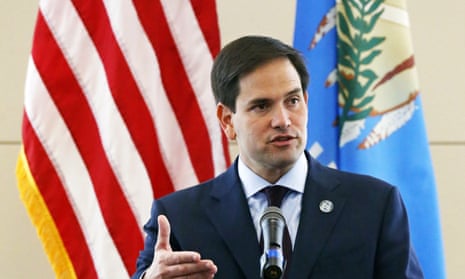As Barack Obama wraps up a three-day visit to Alaska centered on the urgency of tackling climate change, Republican presidential candidate Marco Rubio on Wednesday previewed what energy policy would look like under his administration.
Rubio vowed to reverse key components of the climate agenda Obama has been touting in Alaska, while also making the case for turning back some of the nation’s energy authority to the states and away from the federal government. While outlining his proposals during a swing through Oklahoma – currently the fourth-largest producer of natural gas in the United States – the Florida senator decried in particular the Environmental Protection Agency’s new rules to reduce greenhouse emissions under its Clean Power Plan.
The rules would have “a devastating impact on affordable energy in exchange for little to no environmental benefit”, Rubio said, while pledging to immediately stop them in their tracks.
“It would truly be one of the most expensive and costly regulations ever created. Yet Hillary Clinton has pledged to make defending and expanding it a ‘top priority’,” Rubio said in remarks before the Oklahoma Independent Petroleum Association in Oklahoma City. “As president, I will immediately stop this massive regulation. I’ll pursue a sweeping overhaul of the regulatory system to make sure costs and benefits of new rules are accurately accounted for and that localities, states and industries can meet the timelines I set forward.”
Another key component of Rubio’s plan would be to lift the nation’s ban on crude oil exports, which has been in place for four decades. Rubio said lifting the ban would both boost job creation and bolster national security interests by “reducing the leverage of oil-rich anti-American governments”.
“This ban is a perfect example of just how outdated Washington has become,” Rubio said. “Lifting the crude-oil export ban will be an immediate boon to our economy.”
As domestic oil production has dramatically risen in the United States, the oil industry has been urging the White House to reverse the ban on crude oil exports.
A study commissioned by the Obama administration and released on Tuesday added further momentum to the industry’s cause by concluding that lifting the ban would not increase US gas prices, but may even help to lower them, putting at ease at least some of the concerns previously expressed by those who had been re luctant to support changing the current policy.
The White House has remained mum on its own thinking, as calls have steadily grown among congressional Republicans and a handful of Democrats to allow crude oil exports. In addition to Rubio, Republican presidential candidates such as Jeb Bush and Scott Walker have also backed lifting the ban.
Charles Ebinger, a senior fellow in the Energy Security and Climate Initiative at the Brookings Institution, told the Guardian that lifting the ban “makes a lot of sense”.
“I think we’re moving toward bipartisan support on crude oil exports,” Ebinger said.
He added the he was surprised Rubio did not talk much about boosting ethanol use, given Oklahoma is a fairly significant producer of ethanol and that the question of supporting it would be “a litmus test” in the early voting state of Iowa.
While Rubio did not delve into the issue on Wednesday, he noted that he would unveil a more detailed energy plan this fall. He also used the opportunity to jab his Democratic opponent Hillary Clinton.
“What we hear from Hillary Clinton are more of the same ideas from yesterday – and that’s when she speaks up on the issue at all,” Rubio said. “For the most part, she resorts to empty rhetoric that refuses to chart much of a course in either direction. This is no way to treat one of the most important issues of our time.”
Clinton has backed the proposed EPA rules on coal-fired power plants, but recently declined to take a position on the Keystone XL Pipeline – a controversial project that is opposed by environmental activists.
Ebinger said he expected the Clean Power Plan to remain a “contentious issue” throughout the presidential contest.
“You can read it as a usurpation of states’ rights,” Ebinger said. “I personally think the Clean Power Plan is going to have a lot of legal challenges to it, so I would not be personally surprised if it gets overthrown or at least drastically modified by the courts.”

Comments (…)
Sign in or create your Guardian account to join the discussion